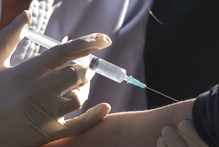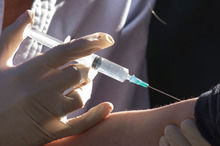It has nothing to with foreign migrants. The ease of air travel nowadays means that infections from one part of the world are only a plane ride away.
NZ has had its fair share of outbreaks over the last couple of years too.
Unless all countries close their borders things are unlikely to change. That is why it is important to get vaccinated.
Measles outbreak hits Auckland
5:06 PM Thursday Apr 16, 2015
Measles is highly contagious and spreads through the air through coughing or sneezing. Photo / Thinkstock
A person diagnosed with measles in Auckland visited several public places while infectious.
Auckland Regional Public Health Service (ARPHS) has urged people who were in the same place as the infectious person to call their GP or Healthline if they have measles symptoms.
Those places were K-Mart and The Warehouse in Manukau Supercentre and the Countdown supermarket at Airport Oaks on April 9, and Middlemore Emergency Department between 7pm on April 12 and 11.30am the next day.
The initial symptoms of measles include a fever, running nose, cough and sore eyes.
After about a week, a raised red rash spreads over the body lasting several days.
Medical Officer of Health Dr Julia Peters said measles was a serious illness and there was no treatment.
"It is vitally important to call your GP or Healthline first because measles is a highly infectious disease," Dr Peters said.
"You can catch it just by being in the same room as someone with measles. It is spread through the air, and someone with measles could easily infect others in a doctor's waiting room".
ARPHS said it usually takes 10-14 days for someone who has caught measles to start showing symptoms.
Anyone infected at the locations the confirmed case visited could start to develop symptoms from Sunday.
ARPHS said the individual with measles has not travelled overseas recently, so they caught the disease from someone in Auckland between March 25 and April 4.
The health service is trying to trace who the person caught measles from.
"We can confirm the individual became infectious on April 7 and will no longer be infectious from April 17," Dr Peters said.
"ARPHS is carrying out contact tracing to help to combat the spread of the disease.
"The only way to avoid catching measles is to have had two measles vaccinations at least
four weeks apart. Children are routinely vaccinated against measles at at 15 months and four years."
Anyone who has had measles is considered immune, which applies to nearly everyone born before 1969. Anyone born in 1969 or later who has not had measles or two doses of the measles vaccine is at risk of catching the disease.
"If you are not sure if you are immune to measles you need to discuss this with your general practitioner," Dr Peters said.
- NZME.
Copyright ©2016, NZME. Publishing Limited



